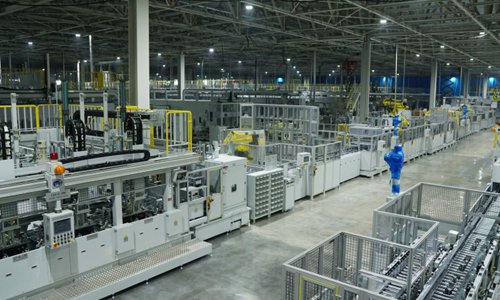
A view of Beijing Hyundai's factory in Southwest China's Chongqing Photo: VCG
Having experienced depressed sales in China for the past few years, South Korean auto brands are struggling to find a new path in the world's largest automobile market and facing a dilemma that can't be solved quickly, Chinese industry analysts told the Global Times on Wednesday.
Beijing Hyundai, a joint venture (JV) between BAIC Motor and South Korean Hyundai Motor, suspended operations at its plant in Southwest China's Chongqing Municipality because the JV is struggling with overcapacity due to sluggish sales, according to domestic financial news outlet Yicai.com.
The plant was shut in December and most workers have been furloughed, the report said, citing a company insider.
Beijing Hyundai did not respond to a Global Times enquiry as of press time.
The Chongqing plant was the fifth passenger car plant of Beijing Hyundai established in China to meet what was then fast-growing demand. It started production in 2017, turning out 300,000 vehicles and 300,000 engines a year.
But sales have seen sharp declines in recent years. Hyundai's retail sales in China fell to about 385,000 units in 2021, down 23.3 percent year-on-year. In the fourth quarter, sales totaled 87,000, down 42.9 percent year-on-year, according to the company's reports released on January 25.
Beijing Hyundai's factories in China sold about 1.65 million vehicles, but the sluggish growth of sales pointed to a capacity utilization rate of less than 30 percent.
Hyundai's sales in China have been on a decline since 2017, a meteoric fall from the 2013-2016 period, especially in 2014 when its sales hit 1.17 million units.
Apart from Hyundai, Kia Corp has also faced poor sales in the Chinese market since 2017. The JV Dongfeng Yueda Kia was formerly one of the popular carmakers in China. Its sales peaked in 2016 at around 650,000 units, but deliveries have since dwindled, falling to 160,000 in 2021.
"South Korean carmakers have not adapted well to the fast development of the Chinese automobile sector. They've responded more slowly than their rivals from Europe and Japan in addressing burgeoning challenges such as electric vehicles," Cui Dongshu, secretary general of the China Passenger Car Association, told the Global Times on Wednesday.
China ranked first globally in terms of new-energy vehicle sales for a seventh straight year in 2021, with a total of 3.52 million units, according to the Ministry of Industry and Information Technology.
With the rise of more domestic brands that have pricing competitiveness, as well as more localized products and technology offered by global automakers exclusively for the Chinese market, it will be difficult for South Korean automakers to catch up in a short time, Cui noted.
The share of South Korean passenger carmakers in China fell to 1.7 percent last month, according to statistics from the China Association of Automobile Manufacturers. Their share fell from 7.35 percent in 2016 to 2.4 percent in 2021.
Meanwhile, carmakers from other countries are bolstering their presence in the Chinese market. In October 2021, Japanese automaker Honda announced the launch of 10 'e:N Series' electric cars in China between 2022 and 2026. Germany-based auto giant Volkswagen said it would likely double sales of its ID battery electric vehicles in China this year.
